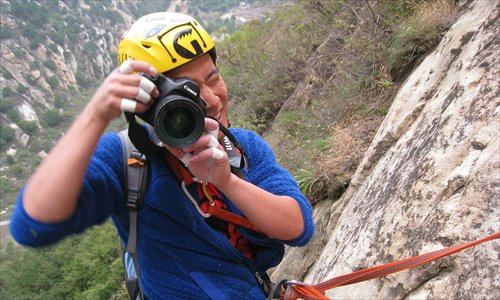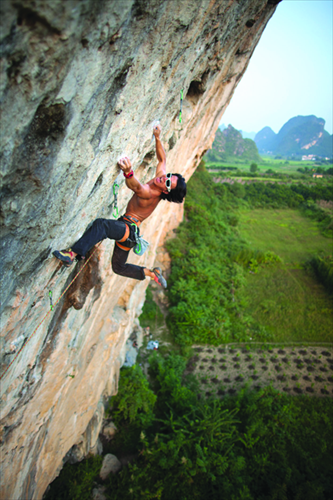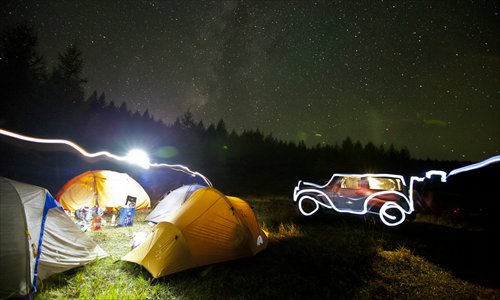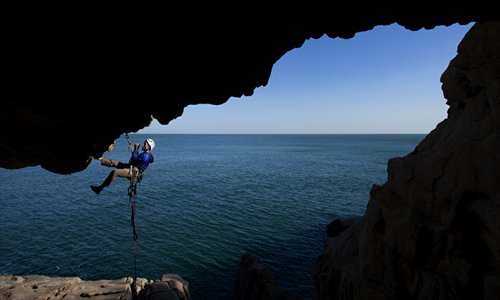Taking photography to the extreme

Zhao Jungang combines his passions for rock climbing and photography in October 2009 at Baihe Valley, Miyun county. Photo: Courtesy of Zhao Jungang
As the popularity of ice climbing, bungee jumping, sky diving and other extreme sports grows in China, so too has interest among amateur photographers in high-adrenaline hobbies. Photographers who captured thrill-seekers' daring escapades were in the past exclusively professionals equipped with the best equipment. But in today's digital age, a growing number of amateur photographers passionate about extreme sports are getting behind the lens to snap their favorite activities and upload their photos online. In addition to developing a following with fans on social media, many extreme sports enthusiasts-cum-photographers are also finding their services in demand from magazines and online groups.

Famed Chinese rock climber Liu Yongbang scales Baishan Mountain in Yangshuo, Guangxi Zhuang Autonomous Region. Photo: Courtesy of Wang Zhen
Risky businessIn 2007, Zhao Jungang decided to combine his hobbies of extreme sports and photography to give him more impetus to tackle new challenges. The athletic 34-year-old native of Shaanxi Province has an outgoing attitude toward life that resonates with many of the people he photographs.
"The length of all our lives is roughly the same, but what I plan to do is to increase the 'width' of my life," said Zhao, who works in marketing. "Life should be full of adventure, precious memories and fun. I choose to record these moments with my camera."
In winter of 2008, Zhao led a group of friends on a climb up Mount Bogda, a 5,445-meter mountain in the Xinjiang Uyghur Autonomous Region. The climb proceeded smoothly until an avalanche struck, partially burying the group.
"Fortunately, we weren't buried too deep and were able to pull ourselves free," Zhao said.
Rather than turning him off outdoor activities, the accident only inspired Zhao to embark on more trips in risky terrain and confirm his belief that life is "full of unpredictable accidents."
Every time Zhao sets out on a rock-climbing expedition, he lugs around 10 kilograms more equipment than other climbers. Aside from safety gear including helmets and harnesses, he carries his pride and joy: a Canon EOS-1D Mark II and its accessories.
Zhao was coy when asked about his finances, saying he would rather travel around the world than settle down and buy a home in Beijing. "Firstly, it isn't worth buying a house and being shackled to a mortgage. Secondly, my wife is also a fan of extreme sports. We have the same outlook on life, so she doesn't give me flak for spending money on travel and photography," said Zhao.
Asked whether he worries about the dangers associated with his hobbies, Zhao insisted "danger can be found everywhere," and not just on a towering cliff face or snowy mountain summit.
Currently learning sky diving and bungee jumping, Zhao said he plans to photograph both sports in the future.

A campsite at Saihanba National Forest Park, Hebei Province. Photo: Courtesy of Zhao Jungang
Telling personal stories
Zhang Yunping, 41, made the transition from an amateur to professional extreme sports photographer and videographer about two years ago. He was convinced to pursue it as a career path after a video he shot on a cell phone went viral among extreme sports fans.
"I interviewed many rock climbers, who shared their opinions about the sport and their ability to make money and win popularity," said Zhang, who lives in Yuxi, Yunnan Province. "They gave very interesting answers and the video became a hit online, which inspired me greatly."
Zhang plans to shoot a video about one of his friends, a vegetable vendor in Yangshuo, Guangxi Zhuang Autonomous Region, who goes rock climbing each day after making his rounds at the wholesale market.
"Compared with photographers who focus on athletes in action, I focus on the personal stories. I like to interview them and share their stories with people around the world," said Zhang.
Zhang said that when it comes to extreme sports, having the most expensive equipment isn't necessary to shoot great photos or videos. All that matters is a person's passion and eagerness to improve with each shoot, he noted.
"After I finish editing a video, I let my wife be the first viewer," said Zhang. "She is not a fan of extreme sports and kind of picky. If she is interested in the video and watches attentively until the end, I can be sure that the video is a success."

A rock climber hangs from a cliff face in Qingdao, Shandong Province. Photo: Courtesy of Wang Zhen
Building support and participation
Wang Zhen might look like a regular IT employee, but away from his work with computers at a government office in Qingdao, Shandong Province, the 38-year-old gets his thrills photographing mountain and rock climbers.
An extreme sport photographer since 2009, Wang shoots tens of thousands of photos each year. Wang, a former avid rock and mountain climber, began to focus on photography after he suffered a broken leg from a fall off a 20-meter cliff in 2000.
Wang was bedridden for five years after his accident. After he made a full-recovery, he reconnected with the local climbing scene and realized there were more people involved than ever.
"We wanted even more people to join so we could have fun together," said Wang. "I started to think about how to promote rock and mountain climbing and clarify misconceptions some people had toward the sports."
Wang's first instinct was to turn to the Internet to build greater awareness. Although he wasn't trained as a photographer, he didn't let his inexperience deter him from picking up a camera.
"At first, I only took pictures with the most simple equipment. I lacked any professional training, but I was eager to learn," he said.
Through trial and error, Wang learned how to improve his technique with the camera. He also mastered editing software such as Photoshop to give his photos a professional finish.
Wang eventually turned his sights beyond the climbing circles of Qingdao and China, brushing up on his English so that he could communicate with foreign climbers.
"Since I became a photographer, I have come to know a lot of people from different places all over the world, including the US, Germany, France, Singapore and Hong Kong," said Wang.
Overseas climbers interested in Qingdao after seeing Wang's photographs, which appeared on popular climbing websites including 8a.nu and climbing.com, enlisted him as their guide when they came to China.
Turning passion into profit
As a full-time photographer, Zhang is sponsored by American outdoor product company The North Face. He also uses cameras and cell phones provided to him by sponsors, including Nokia.
Wang, who is also sponsored by The North Face, is often invited to record events organized by the company. He has also earned money selling his photographs to magazines since 2012, with the average sum ranging from 1,000 yuan to 1,500 yuan ($165-$247). The most profitable photo he snapped was a rock climbing one for a Japanese sports magazine, which paid him 8,000 yuan.
"I'm actually considering quitting my job to become a full-time photographer. I think I can make a living from my photography," said Wang.
However, Zhao wants to keep extreme sports photography just as a hobby. Most of his photos are posted to his Sina Weibo and WeChat accounts. Despite some of his photos fetching as much as 20,000 yuan, he still thinks payment for photos is "unreasonably low" in China compared with overseas.
Pursuit of perfection
Zhao is already bracing for a busy 2014, with plans to photograph extreme sport events in Norway, Canada, the US, Chile, Argentina, France and China. "Even though I'll spend about half of the year abroad, I'm able to balance my work commitments [in marketing] with photography," said Zhao. "Luckily, my boss is very supportive of my hobby."
Rather than scorning amateurs for diminishing their craft, many professional photographers are supportive of extreme sports fans who dabble in photography. Guo Liyuan, a photographer with his own studio in Chaoyang district and more than 210,000 followers on Sina Weibo, began himself as an amateur before he turned professional two years ago.
"Anyone can be a photographer," said Guo, who specializes in portrait and wedding photography. "There is no particular threshold or criteria. If your photos are appreciated by people and your fees are considered reasonable, no one cares whether you're trained or qualified."
Guo conceded that the rise in amateurs had intensified competition, but this phenomenon hasn't cheapened the art form.
"It's up to the photographer on whether to choose small profits and quick returns or pursue perfection," he said.